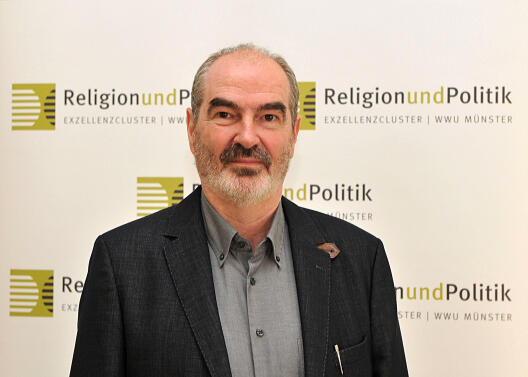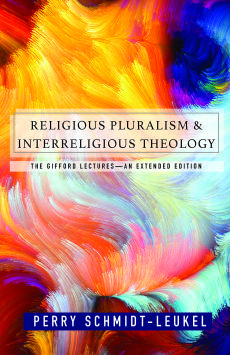"The Self-Image of All Religions Will Change"
Public book presentation: scholar of religious studies Perry Schmidt-Leukel discusses his theories on religious diversity with Mouhanad Khorchide, Bernhard Nitsche and Linda Woodhead – “Religions resemble each other in their pluralism” – Gifford Lectures published in book form

Press release of the Cluster of Excellence from 25 April 2017
A new theory on religious pluralism and on the theological rapprochement of religions will be presented by scholar of religious studies Prof. Dr. Perry Schmidt-Leukel on Tuesday, 2 May in a public book presentation at the Cluster of Excellence “Religion and Politics” in Münster. According to the theory, traditional theologies do not provide a sufficient answer to the growing challenge of religious diversity and conflicts. “Instead of continuing to practice their theology exclusively in an religiously specific way, religions will increasingly rely on interreligious theology in the future,” says Schmidt-Leukel. He explains this in detail in his new book “Religious Pluralism and Interreligious Theology”. During the book presentation he will discuss with Islamic theologian Prof. Dr. Mouhanad Khorchide from the Cluster of Excellence, with British sociologist of religion and Blumenberg Visiting Professor Prof. Dr. Linda Woodhead and with Catholic theologian Prof. Dr. Bernhard Nitsche from the WWU. The event is hosted by Protestant theologian and Judaic scholar Prof. Dr. Lutz Doering.
Anyone interested is invited to join the presentation in English on 2 May, from 11:15 to 12:45 in the lecture hall of the Cluster of Excellence, JO 101, Johannisstraße 4. The volume by US publisher Orbis Books is an extended edition of Schmidt-Leukel’s lectures within the framework of the renowned Gifford Lectures. He held them in Glasgow in 2015 as the first German lecturer in 25 years. It is one of the highest international academic honours in the field of religious philosophy and theology. Schmidt-Leukel’s theory will be discussed at further international conferences: at the congress of the recently-founded European Academy of Religion in Bologna in June, at Minzu University in Peking in October, and at the annual conference of the renowned American Academy of Religion (AAR) in November.

“According to my theory, religions such as Christianity, Islam, Hinduism and Buddhism have more in common than previously assumed. They are similar with regard to their respective internal diversity,” says the scholar. “Other religions and those of different faith are less alien than one would first believe. This fact offers an alternative to the widespread opinion that religions were not comparable and incompatible.” What distinguishes religions may frequently be found as a difference within one's own religion. “This makes it possible to extend ecumenical theology to interreligious theology.” Within interreligious theological discourse, topics and questions are said to arise that are known from the theology of one's own religion, but at the same time shed a new light on the matter. Schmidt-Leukel: “The key to understanding different religions thus lies within one's own.”
The scholar of religious studies has developed his “Fractal Theory of Religious Diversity” following the fractal theory by mathematician Benoît Mandelbrot (1924-2010), according to whom many objects in nature, such as ferns, trees or cauliflower, but also ice crystals, rock structures or coast-lines, consist of small copies of themselves. “The fractal understanding of religious diversity,” says Schmidt-Leukel, “almost demands an interreligious theology.”
In addition to the Gifford Lectures, the new book contains a lecture series on approaches related to religious pluralism in Christianity, Judaism, Islam, Hinduism and Buddhism, which Prof. Schmidt-Leukel held at the Zhejiang University of Hangzhou in China in 2014. The academic defines “religious pluralism” as an attitude that sees other religions as “indeed different, yet still equally valid and, in many cases, as complementary roads to salvation”. In the end it is about a change in the self-image of all religions. “This is also important from a political perspective, inasmuch as religious claims of being solely valid or superior are often the basis of interreligious conflict potential.” The book summarises the results of Schmidt-Leukel's research on the pluralistic capacity of religions and on interreligious theology at the Cluster of Excellence “Religion and Politics” since 2009.
“Theology of the Future”
“In contrast to intercultural philosophy, interreligious theology takes the confessional nature of religions very seriously,” explains the scholar. Behind the denominations of Muhammad as the “Prophet”, of Jesus as the “Son of God” and of Gautama as the “Buddha”, the motifs show basic similarities: “For Muslims, the word of God becomes text, i.e. the Koran, whereas for Christians, it becomes a person, i.e. Jesus. Both religions, however, know the other concept and in both cases, it is about how to understand the presence of God in the act of divine revelation,” says the Anglican theologian. Many times, behind the rejection of other religious beliefs, there is more similarity than one might expect, for example, if something is rejected that the other does not even have a standpoint on. “Instead of considering other religions as a threat, they could enrich one's own faith.” Therefore, an interreligious theology is thought to draw not only upon holy scriptures of one's own religion, but also upon those of others. “This offers great opportunities for how to deal with the growing religious plurality of our society.” (vvm/ill)

